

The lipstick effect. Sarah Hill has posted at Scientific American on a new paper (pdf) that she (and colleagues) has written on the lipstick effect.
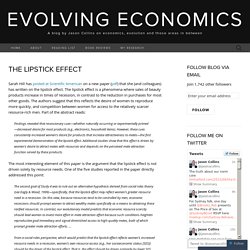
The lipstick effect is a phenomena where sales of beauty products increase in times of recession, in contrast to the reduction in purchases for most other goods. The authors suggest that this reflects the desire of women to reproduce more quickly, and competition between women for access to the relatively scarcer resource-rich men. Part of the abstract reads: Findings revealed that recessionary cues—whether naturally occurring or experimentally primed—decreased desire for most products (e.g., electronics, household items). The "Lipstick Effect" Is Real, And Deeply Rooted Into Women's Mating Psychology. 'The Lipstick Effect': Women Spend More On Beauty Products During Recessions, Study Says.
When economic misery abounds, beauty products start to look like a good investment.
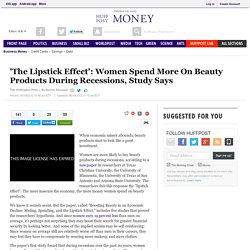
Women are more likely to buy beauty products during recessions, according to a new paper by researchers at Texas Christian University, the University of Minnesota, the University of Texas at San Antonio and Arizona State University. 'The Lipstick Effect': Women Spend More On Beauty Products During Recessions, Study Says. The Psychology Behind the Lipstick Effect. What is the cost of beauty?
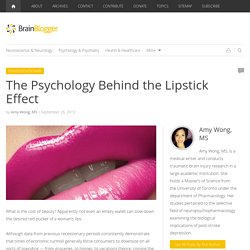
Apparently not even an empty wallet can slow down the desired red pucker of a woman’s lips. Although data from previous recessionary periods consistently demonstrate that times of economic turmoil generally force consumers to downsize on all sorts of spending — from groceries, to homes, to vacations (hence, coining the term “stay-cation”) — there is one consumer good that has fared unusually well in the midst of layoffs and home foreclosures: beauty products.
For example, sales figures from one of the world’s biggest cosmetics companies — L’Oreal — showed a surprising growth of 5.3% in 2008, a year when the rest of the economy was suffering record declines in sales. Lipstick Effect Definition. Leading Lipstick Indicator Definition. Redefining the “Lipstick Effect”– Examples of Recession-Proof Categories. When an economy enters troubled waters, this does not spell bad news for all categories.
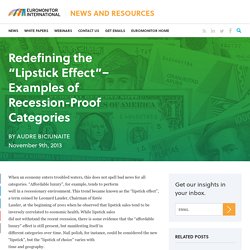
“Affordable luxury”, for example, tends to perform well in a recessionary environment. This trend became known as the “lipstick effect”, a term coined by Leonard Lauder, Chairman of Estée Lauder, at the beginning of 2001 when he observed that lipstick sales tend to be inversely correlated to economic health. While lipstick sales did not withstand the recent recession, there is some evidence that the “affordable luxury” effect is still present, but manifesting itself in different categories over time. Nail polish, for instance, could be considered the new “lipstick”, but the “lipstick of choice” varies with time and geography. Figure 1: Response to Recession in Developed World Source: Euromonitor International (Passport Industries) Note: Industry dynamics during the 2008/2009 downturn. The Lipstick Effect - How Recessions Reveal Female Mating Strategy Sales figures from one of the world's largest cosmetics companies - L'Oreal - revealed that during 2008, a year when the rest of the economy suffered record declines in sales, this cosmetics leviathan experienced sales growth of 5.3%.
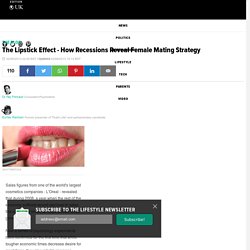
Now a series of psychology experiments have confirmed for the first time that while tougher economic times decrease desire for most items, they also reliably increase women's yearning for products that boost their attractiveness. Psychologists contend that these 'lipstick' effects are operating largely below conscious awareness of men and women, and therefore require precise experiments to reveal them. This is the first experimental demonstration of the famous 'lipstick effect' with psychologists confirming this psychological phenomenon is driven by women's desire to particularly attract mates 'with resources'. For example, wars are known for moments of most intense romance. But was this men or women who were buying cosmetics or personal care products?
The Lipstick Effect: In Recessions, Women Still Buy Beauty Products - Ideas Market. By Christopher Shea Katy Winn / Getty Images Products by Elizabeth Arden are among those considered relatively recession-proof.
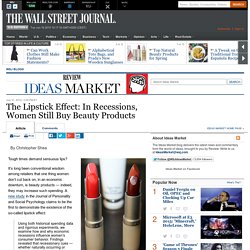
Tough times demand sensuous lips? It’s long been conventional wisdom among retailers that one thing women don’t cut back on, in an economic downturn, is beauty products — indeed, they may increase such spending. Lipstick May Be an Economic Indicator. Into the red: 'lipstick effect' reveals the true face of the recession. Some say hemlines and heels rise and fall with the state of the stockmarket.
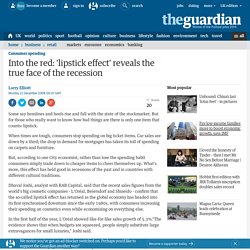
But for those who really want to know how bad things are there is only one item that counts: lipstick. When times are tough, consumers stop spending on big ticket items. Car sales are down by a third; the drop in demand for mortgages has taken its toll of spending on carpets and furniture. But, according to one City economist, rather than lose the spending habit consumers simply trade down to cheaper items to cheer themselves up. Lipstick, the Recession and Evolutionary Psychology - Guest Blog - Scientific American Blog Network. `Lipstick effect' in full swing, economists say. 'Lipstick Effect', which claims women spend more on cosmetics in hard times is sexist and untrue, says top economist.
Leading economist Julie Nelson says theory reinforces gender stereotypesPhenomenon still 'a far cry from being scientifically demonstrated' By Sadie Whitelocks Published: 15:15 GMT, 4 September 2012 | Updated: 17:11 GMT, 4 September 2012 A leading economist has thrown the popular 'Lipstick Effect' theory into doubt, suggesting that the research behind it is based on 'over-generalised gender stereotypes'.
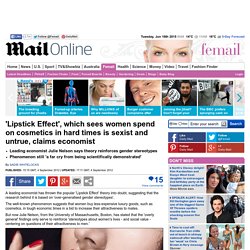
The well-known phenomenon suggests that women buy less-expensive luxury goods, such as cosmetics, in tough economic times in a bid to increase their attractiveness to mates. But now Julie Nelson, from the University of Massachusetts, Boston, has stated that the 'overly general' findings only serve to reinforce 'stereotypes about women's lives - and social value - centering on questions of their attractiveness to men.' LipstickEffectMS20March2012.pdf.